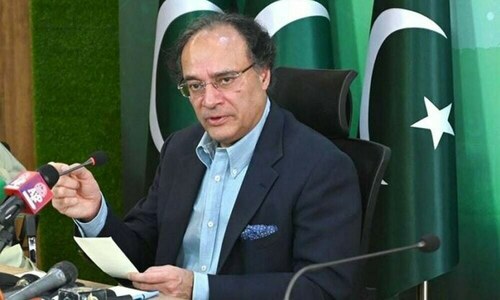Pakistan’s Finance Minister Addresses International Conference on Development Financing
SEVILLE, Spain: Senator Muhammad Aurangzeb, the Federal Minister for Finance and Revenue, represented Pakistan at the plenary session of the Fourth International Conference on Financing for Development (FFD4) in Seville, Spain.
The conference, designed to tackle the increasing deficit in funding for sustainable advancement, provided a worldwide arena for nations to share their national viewpoints and describe their commitments and anticipations regarding financing for sustainable progress.
In his speech, Senator Aurangzeb detailed Pakistan’s aims, difficulties, and modification initiatives, while advocating for immediate and synchronized international measures to reinforce the global financial system based on fairness, unity, and inclusivity.
Call for Global Economic Reforms
The Finance Minister recognized the magnitude of worldwide issues confronting developing countries, highlighting a convergence of strains such as growing debt vulnerabilities, intensifying climate consequences, and the reversal of development successes, which have amplified the global SDG funding shortfall.
He emphasized that while previous conferences established the groundwork for a more inclusive global financial structure, further efforts are required to convert these pledges into practical mechanisms that provide substantial support to nations most in need.
Senator Aurangzeb commended the renewed dedication shown in the ‘Compromiso de Sevilla’ and valued its pragmatic and forward-thinking proposals. These involve promises to enhance assistance for domestic resource mobilization, reverse aid reductions, boost concessional financing via new metrics beyond GDP, broaden the lending capacity of multilateral development banks, increase local currency lending, and redirect unutilized Special Drawing Rights (SDRs) via organized frameworks.
He urged for swift implementation of these commitments, notably in debt reform, including establishing an institutional platform for liquidity and debt management assistance, creating a borrower-focused platform to amplify the voice of developing countries, and starting an intergovernmental process under the UN to resolve deficiencies in the current debt structure.
The Minister informed the global participants that Pakistan, despite dealing with numerous external shocks from pandemics to climate-related catastrophes, is undertaking significant domestic reforms to align with global ambitions. He presented Pakistan’s new five-year National Economic Transformation Plan, named ‘Uraan Pakistan,’ which is based on five pillars: Exports, E-Pakistan, Environment, Energy & Infrastructure, and Equity.
He mentioned that through consistent macroeconomic policies, Pakistan has realized a primary budget surplus, reduced inflation, and decreased its debt-to-GDP ratio. Moreover, the nation is improving domestic resource mobilization through tax base expansion, digitization of tax administration, and enhancements in public financial management, aiming to elevate the tax-to-GDP ratio to over 13% in the medium term.
Senator Muhammad Aurangzeb also underscored Pakistan’s initiatives in broadening access to green and Islamic finance, enhancing financial inclusion via digital infrastructure, and drawing foreign direct investment through a novel investment policy and the Special Investment Facilitation Council. He emphasized that these endeavors demonstrate Pakistan’s resolve to translate policy into action, despite external limitations.
Earlier, Senator Aurangzeb co-chaired the Multi-Stakeholder Roundtable 2 on “Leveraging Private Business and Finance” with Canadian Deputy Minister of International Development, Christopher MacLennan. The session explored how private finance, innovation, and investment can be more effectively utilized for sustainable development and economic stability.
In his opening remarks, Senator Aurangzeb stressed that public resources alone cannot fill the extensive financing gap and that private finance, when coupled with robust public policy, is essential for enabling development at scale. He advocated for decisive actions to enhance domestic resource mobilization, deepen capital markets with SDG-linked instruments, and foster policy environments that attract and reduce risks for private capital in crucial sectors like climate resilience, housing, and SME finance.
The Finance Minister emphasized the significance of regulatory coherence, predictability, and targeted incentives to facilitate private investment. He highlighted the necessity of mainstreaming mechanisms such as credit guarantees, outcome-linked bonds, debt-for-climate swaps, and catalytic first-loss instruments, urging that public funds be strategically employed to leverage greater volumes of private and philanthropic capital.
In his concluding statements, Senator Aurangzeb reinforced that the goal should be to mobilize not only more finance but smarter and fairer finance. He laid out explicit action points at national and global levels, including institutional strengthening, aligning fiscal policies with SDG priorities, and reforming credit rating methodologies to reflect climate vulnerabilities and development pathways.



Comments (0)
No comments yet. Be the first to comment!
Leave a Comment